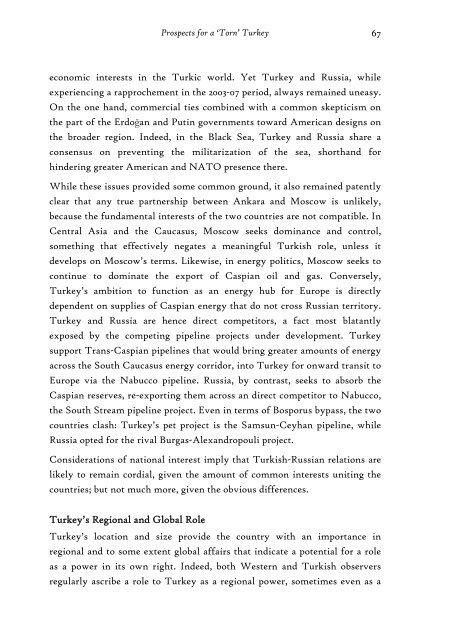2008_10_SRP_CornellKaraveli_Turkey
2008_10_SRP_CornellKaraveli_Turkey
2008_10_SRP_CornellKaraveli_Turkey
Create successful ePaper yourself
Turn your PDF publications into a flip-book with our unique Google optimized e-Paper software.
Prospects for a ‘Torn’ <strong>Turkey</strong> 67<br />
economic interests in the Turkic world. Yet <strong>Turkey</strong> and Russia, while<br />
experiencing a rapprochement in the 2003-07 period, always remained uneasy.<br />
On the one hand, commercial ties combined with a common skepticism on<br />
the part of the Erdoğan and Putin governments toward American designs on<br />
the broader region. Indeed, in the Black Sea, <strong>Turkey</strong> and Russia share a<br />
consensus on preventing the militarization of the sea, shorthand for<br />
hindering greater American and NATO presence there.<br />
While these issues provided some common ground, it also remained patently<br />
clear that any true partnership between Ankara and Moscow is unlikely,<br />
because the fundamental interests of the two countries are not compatible. In<br />
Central Asia and the Caucasus, Moscow seeks dominance and control,<br />
something that effectively negates a meaningful Turkish role, unless it<br />
develops on Moscow’s terms. Likewise, in energy politics, Moscow seeks to<br />
continue to dominate the export of Caspian oil and gas. Conversely,<br />
<strong>Turkey</strong>’s ambition to function as an energy hub for Europe is directly<br />
dependent on supplies of Caspian energy that do not cross Russian territory.<br />
<strong>Turkey</strong> and Russia are hence direct competitors, a fact most blatantly<br />
exposed by the competing pipeline projects under development. <strong>Turkey</strong><br />
support Trans-Caspian pipelines that would bring greater amounts of energy<br />
across the South Caucasus energy corridor, into <strong>Turkey</strong> for onward transit to<br />
Europe via the Nabucco pipeline. Russia, by contrast, seeks to absorb the<br />
Caspian reserves, re-exporting them across an direct competitor to Nabucco,<br />
the South Stream pipeline project. Even in terms of Bosporus bypass, the two<br />
countries clash: <strong>Turkey</strong>’s pet project is the Samsun-Ceyhan pipeline, while<br />
Russia opted for the rival Burgas-Alexandropouli project.<br />
Considerations of national interest imply that Turkish-Russian relations are<br />
likely to remain cordial, given the amount of common interests uniting the<br />
countries; but not much more, given the obvious differences.<br />
<strong>Turkey</strong>’s Regional and Global Role<br />
<strong>Turkey</strong>’s location and size provide the country with an importance in<br />
regional and to some extent global affairs that indicate a potential for a role<br />
as a power in its own right. Indeed, both Western and Turkish observers<br />
regularly ascribe a role to <strong>Turkey</strong> as a regional power, sometimes even as a


